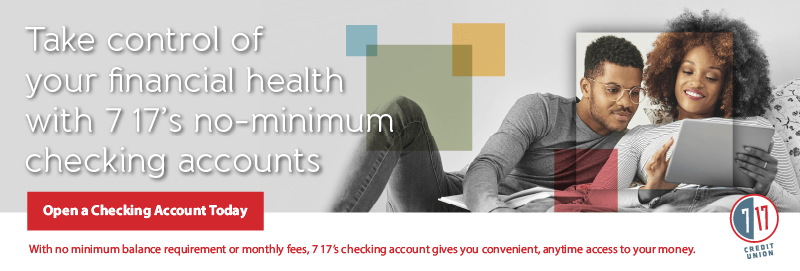- 7 17 Staff
Budgeting Made Easy: Tips for Financial Success

Welcome to the New Year! With a new year comes new resolutions: For some it’s eating better, for others it’s getting fit, and for many it’s getting their finances in order. When it comes to getting your finances in check, it can be difficult to know where to start.
Luckily, KOFE (Knowledge of Financial Education) has several resources that can help you get on the right track for a successful financial future. One resource is their publication “Budgeting Made Easy” which takes you step-by-step through creating a budget. It also offers a few helpful tips for avoiding major debt.
Tackling the budget
It all starts with a budget, an important tool for financial success. While it might seem daunting at first, making a budget is easy, and it can position you for a successful start to the year.
Start the process by writing down all sources of net income, which is considered income you would make after anything such as taxes, retirement funds and social security is taken out. This income includes your regular paycheck, any freelance income you receive, your spouse’s or partner’s income and more. Not sure of what to track? KOFE provides a full list of potential income sources to use as a reference.
Next, list your fixed, flexible and discretionary monthly expenses. KOFE provides an easy worksheet to use to track these costs. Here’s a quick breakdown of what those expenses look like.
Fixed: These are the expenses that do not change, such as a rent or mortgage payment, car payments and student loan repayment.
Flexible: These are expenses, such as groceries, utilities, transportation costs, such as gasoline or a ride-sharing service, and medical expenses. These are flexible because they can change from month to month, and you may be able to control how much you spend.
Discretionary: These are items that, while fun, are not necessary for survival. They can include concerts, dining out, sporting events and new clothing.
The key to a proper budget is to include everything you spend your money on, even daily coffee, digital music subscriptions or the occasional spa-day splurge, to make sure you have the clearest picture of your monthly spending. Reviewing bank and credit card statements can be a big help when it comes to covering all of your bases.
Finally, see where you stand. Add up your expenses and subtract from your total monthly income. If your income is greater than your expense, then you’re in the clear! If not, then it’s time to review your spending, prioritize your expenses and see what can be cut or lowered to create a more workable budget. KOFE includes suggested percentages for spending categories to use as a guidepost.
TIP: Try to pay yourself first by socking away some cash in a savings account. It might seem difficult at first, especially if you’re working on a shoestring budget. But, even if you put away five percent of your monthly income to start, your savings will add up quickly. Then, as it accumulates, you’ll have a reserve in place and be able to stop living paycheck to paycheck.
Be mindful of credit card use
Using a credit card to stretch or cover expenses can be tempting. While it might help immediately, it can hurt in the long run, and it shouldn’t become a regular habit. A credit card is still a loan that has to be paid off. When it comes to credit cards, keep in mind:
- Paying just the minimum payment can lead to spending hundreds to thousands more on interest.
- Shop around if you can, and keep an eye out for the best credit card rates.
- Pay your cards on time to avoid late fees or dings to your credit report.
- If you can’t make a payment, call your credit card issuer to see if you can make alternative payment arrangements.
For a more in-depth look at Budgeting Made Easy and for access to a budget-making spreadsheet, please visit our KOFE page. Once you access the KOFE site, select financial publications from the KOFE Table drop-down menu. 7 17 has partnered with KOFE to provide free financial education tools to help support members’ long-term financial health. Resources include publications, videos and more. Plus, you have free access to financial coaches, seven days a week!
